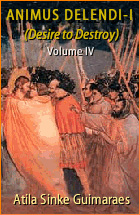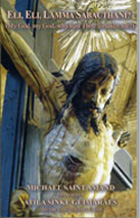What People Are Asking
Which Is the Sanctified Day for Catholics:
Sunday or Saturday?
 Volume I |
 Volume II |
 Volume III |
 Volume IV |
 Volume V |
 Volume VI |
 Volume VII |
 Volume VIII |
 Volume IX |
 Volume X |
 Volume XI |
 Special Edition |







I am pleased to learn of your existence. I am learning about the Catholic Latin traditions from you, a bit shaken, but it is better late than never.
I watched "Our Lady of Good Success," It is amazing, yet alarming, the world has changed lots and quietly. People are quite anxious, normal, with the serpent tweeking in the back...
Anyhow, my friend asks me, is the Sabbath for us Saturday? And is it OK to attend Mass on Saturday evening instead of Sunday?
Just to clarify, I myself heard about the Sabbath as being two days:
- Saturday, and
- The day of rest of the Jews.
Also a day of rest for Christians means to me, a day to go to Mass and not to work. Also a day on which we should not deal with money, like buying groceries or doing shopping, sometimes it is hard, but we must buy premade dishes for Sunday like fried fish, for example, as they stink if made in the house.Now, I am Maronite Christian. And my friend lives pretty far from me, in the USA. Also my friend lives far from her Eastern Church, about half an hour. Therefore, she attends an English Mass said by a Latino priest.
I told her that the Jews believe a day starts around 5pm the day before and ends next day at 4:59pm. So they prepare for a new day, the evening before.
In that sense, going to Church and to Mass on Saturday afternoon/evening, is it equivalent to going to Church on Sunday morning? Am I right or totally wrong? And because we are Christians, should we have our day of rest on Sunday, and go to Mass on Sunday evening if we find it quieter than the morning Mass? Mind you, no Mass on Sunday is quiet, as there are always more people than usual, that was the case of pre covid-19.
She seeks quiet times and quiet Masses. But she is quite adamant on wanting to go on Saturday to Mass, so just want to give her the correct answer, and she will have to decide. I hope I made my question clear and not more complex?
Thank you a lot.
N.B. I felt like I should be working with you after I watched "Our Lady of Good Success", just an inner feeling.
Do you have or run a small Christian lay community?
Blessings of Jesus Christ be always with you all.
N.S.
TIA responds:
Good evening N.S.,
Your concern for keeping Sunday as a holy day is commendable, because the violation of the Sunday is one of the great evils in the modern world. In 1846, Our Lady of La Salette wept because of the sins of men, especially for the profanation of her Son's name and not keeping holy Sunday, the Lord's day. Keeping holy the Sunday is thus a very grave matter.
- To answer your first question, the Catholic Sabbath is not on Saturday, but on Sunday. The Sabbath of the Old Testament was held on the seventh day of the week beginning on Friday at sunset and ending on the sunset of Saturday. The faithful Jews abstained from servile work and observed the prescribed religious obligations.
- Regarding your second question, some of the confusion that your friend is having about the Saturday Mass is the result of progressivist changes during Vatican II. Prior to Vatican II, there was no "Mass of Anticipation" or "Vigil Mass" on Saturday that would fulfill the Sunday obligation.
- Finally, we are pleased you are moved to spread the devotion to Our Lady of Good Success. Our three-part video on Our Lady of Good Success, which you can view
here on YouTube, is now available as a video. Perhaps you could show it to your friends, family, or various groups you know. Our Lady promised her special help - in their spiritual and material needs - to those who would spread this devotion in these crucial times. She is certain to keep her promise.
Cordially,After the great Sunday of Our Lord's Resurrection, the Sunday of every week was made holy and Catholics from Apostolic times have set apart Sunday as a day for the public and solemn worship of God. The old Jewish Sabbath on Saturday was abolished with the institution of the New Covenant. St. Paul wrote in his Epistles that the Jewish Sabbath was no longer obligatory for Christians (Col 2:16; Gal 4:9-10; Rom 14:5). In Acts (20:7) St. Paul keeps the first day of the week (Sunday) holy by assembling the Catholics together for the Holy Sacrifice of the Mass and preaching to them until midnight.
The footnote for the Douay-Rheims Bible explains that St. John Chrysostom and many other Church fathers saw this passage (Acts 20:7) as a proof that the change of the Sabbath from the Saturday to the Sunday had been established at a very early time: "This change was undoubtedly made by the authority of the Church; hence the exercise of the power, which Christ had given to her: for He is the Lord of the Sabbath." (Douay-Rheims Bible)
St. Paul once again affirms the preeminence of the Sunday in 1 Cor 16:2, and in the first chapter of the Apocalypse, St. John calls Sunday the Lord's Day.
Sunday is the true Sabbath for faithful Catholics, and it has been kept as a holy day since the most ancient of times. St. Ignatius of Antioch made this clear in the 1st century when he wrote: "Those who were brought up in the ancient order of things have come to the possession of a new hope, no longer observing the Sabbath, but living in the observance of the Lord's Day, on which also our life has sprung up again by Him and by His death." (Ep. ad Magnes. ix). Catholics who wish to abide with the traditions of the Apostles ought to assist at Mass and give their homage to God on the Sunday of every week.
As you noted, Sunday is not only a day on which it is required to attend Mass, but also a day of rest. The earliest written account of Sunday being a day of rest is from Tertullian who writes that even businesses ought to be deferred from a Sunday, "lest we give any place to the devil" (De orat., xxiii; cf. Ad nation., I, xiii; Apolog., xvi). This rest does not follow the same prescriptions as the ancient Jewish Sabbath that was abolished, but the Church still prescribes certain rules that regulate the practices of the day.
The Church law regarding Sunday rest was officially formulated by the 8th century: Servile work, public buying and selling, the public and solemn taking of oaths, and pleading in law courts were all forbidden. This law is still dictated in the 1917 Code of Canon Law: Canon 1248 prescribes that “on feast days of precept, Mass is to be heard; there is an abstinence from servile work, legal acts, and likewise, unless there is a special indult or legitimate customs provide otherwise, from public trade, shopping, and other public buying and selling." (1)
According to the 1917 Code of Canon Law as promulgated under Pope Benedict XV - which simply codified the already existing canon law - a priest was forbidden to say Mass during the evening and night hours, except for in special circumstances such as Christmas Midnight Mass. Canon 821 § 1. states, "The beginning of the celebration of Mass shall not occur earlier than one hour before first light or later than one hour after noon."
Under necessary circumstances, Pope Pius XII allowed for local Ordinaries to permit the celebration of Mass in the evening and no earlier than 4:00 P.M. This was permitted on account of the shortage of priests, and the Mass was always celebrated on the evening or night of the Sunday or feast day, not on the preceding evening.
The reforms of Vatican II, however, granted permission for any priest to celebrate Mass in the evening and night, thus opening the door for the "Mass of Anticipation" to become widespread.
The revised Code of Canon Law promulgated by John Paul II in 1983 gave permission for Catholics to fulfill their Sunday obligation by assisting at a Mass on the evening of the preceding day, a concession that was not granted in the 1917 Code of Canon Law. (2) Indeed, it would have been unthinkable to any Catholic of the past to fulfill the Sunday obligation on the preceding Saturday. Sunday is the holy day sanctified by Our Lord's Resurrection.
The only exception to this rule was given to the miners in the 1950's. Pius XII authorized the miners to assist at Mass on Saturday evening instead of the Sunday, because they were forced to work all day on Sunday. This was an extraordinary exception.
When the new law for Sunday obligations was instituted, it soon became greatly abused, and now many Catholics go to the Saturday Mass as a convenience, in order not to lose hours of their secular Sunday activities by attending Mass or to find a quieter place like your friend.
With this being said, the Saturday evening before Sunday was still held as sacred by Catholics of the past who considered the observance of Sunday to begin at sunset (Vespers) of Saturday and to end at the Vespers of Sunday. Throughout the Middle Ages and even up until recent times, many faithful Catholics went to their parish churches on Saturday evenings to assist at the solemn chanting of Vespers.
After the Middle Ages, the reckoning of Sunday eventually changed from sunset to sunset to midnight to midnight which was the reckoning used by the Church for the fulfilling of the Sunday obligations up until Vatican II.
We hope that you and your friend can benefit from these answers. Since Our Lady of La Salette specifically asked that Sunday be kept holy, it seems that we, as counter-revolutionary Catholics, should heed her request.
TIA correspondence desk
______________________
Related Topics of Interest